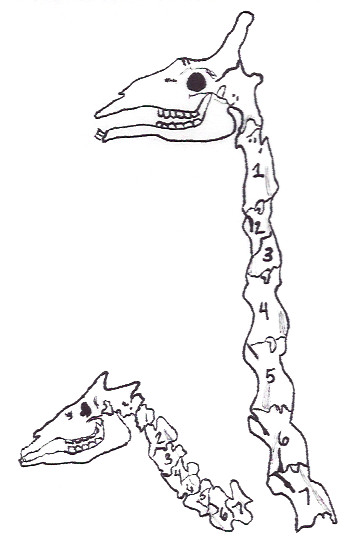You do understand that science is not in the business of proving anything? Science is only in the business of generating hypothesis, finding evidence, and inferring based on the evidence which hypothesis is more likely than the others? All scientific conclusions are inevitably probabilistic, that is why all scientific papers use probabilistic language in their conclusion ( may, could, should, probably, likely, unlikely) etc.Oh okay.
I'll remember that the next time I see a Woodpecker banging its beak against the hard bark of a tree. I'll tell the girls with their long fingernails, "There's nothing to it. You can do it."
Then I'll try to keep a straight face.
The way you are speaking is no different it seems, than when it was suggested that the cell was such a simple thing, that evolution to multicellular organism, was just a snap of the finger.
However, over a century and a half later, what do the know of evolution from unicellular to multicellular?
Many hypotheses exists.
Scientific observations have clearly revealed how genes that stimulated keratin formation in the jaws and retarded teeth formation evolved in dinosaurs as they evolved into modern birds through a series of mutations in the jaw formation genes of these organisms. In fact scientists have created toothed birds by reversing these mutations to confirm this. Further details here,
The words in red do sound quite nice, don't they.
What was observed? How does one reverse a mutation that has not been seen to occur... far more, a series of them?
Did they create mutations that produced the result... say like a mouse to elephant, and then reverse it?
Why reverse a process that you observed in realtime?
Regarding your article How did dinosaurs evolve beaks and become birds? Scientists think they have the answer
I think the entire article says it all.
Once you know that many dinosaurs had feathers, it seems much more obvious that they probably evolved into birds.
...and that's just the beginning of the article.
Suggestions and proposition are made... I understand.
What scientists think, or believe, and what has actually been demonstrated through the scientific method, are two completely different things.
Pseudoscience -
statements, beliefs, or practices that are claimed to be both scientific and factual, but are incompatible with the scientific method.
Did you answer my question? Which one? They were several.
However, apparently no, you have not answered the questions. You added something other than what you were saying. So you can perhaps explain what question you were attempting to answer.
Heterochronic truncation of odontogenesis in theropod dinosaurs provides insight into the macroevolution of avian beaks
At least seven transitions to edentulism occurred independently in theropod dinosaurs (1⇓–3), all presumably accompanied by the appearance of a horny beak (1). Although the structure and morphogenetic events of beak formation have been well studied in extant birds (4⇓–6), evolutionary developmental mechanisms linking beak formation and tooth loss have proven difficult to test, given extant models. Previous authors hypothesized that avian tooth loss was due to inactivation of odontogenic signaling pathways (7), but acknowledged that regional tooth loss initially accompanied various acquisition of beaks in Cretaceous birds (8, 9). Therefore, degradation of the odontogenic program alone cannot provide a developmental explanation for the coupling of tooth loss and beak formation (9). Macroevolutionary hypotheses for these phenomena have included weight-saving in response to the evolution of flight (1, 10) and efficient processing of herbivorous diets (3). Weight-saving hypotheses have been rejected by recent studies (11, 12) and fail to explain the tradeoff between tooth loss and beak development in nonvolant theropod lineages, while hypotheses related to dietary specialization appear salient for at least initial rostral beak formation in theropods.
Here we provide fossil evidence consistent with postnatal truncation of odontogenesis in several lineages of theropod dinosaurs that eventually reach complete edentulism.
Heterochrony - Wikipedia
Heterochrony can be identified by comparing phylogenetically close species, for example a group of different bird species whose legs differ in their average length. These comparisons are complex because there are no universal ontogenetic timemarkers.
That extract is the bare minimum, of what the article reveals.
How is any of this different to what was said earlier here?
Assumptions are made, and there is no way to verify that those assumptions are true.
For example...

Despite greatly differing neck lengths, giraffes (right) have no more cervical vertebrae, just 7, than their fellow giraffids, okapi (left). With the number constrained, the development of the vertebrae is extended, allowing them to grow longer.
How long did it take the giraffe's neck to grow? 10 years? 100? 1,000,000? 100,000,000?
How long did it take the character on the right to grow?

What does similarities reveal, other than that things are similar?
What does similarities between a Transam and Mustang reveal?
Also, just because scientists can clone sheep, doesn't mean that cloning naturally occur, does it.
If you want proof and definitive statements, then nothing in science provides anything like that.....ever.

